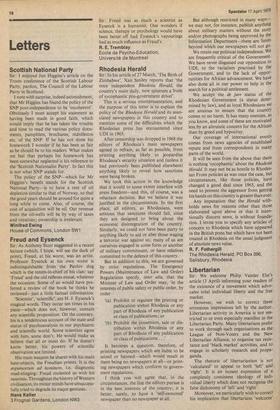Freud and Eysenck
Sir: As Anthony Storr suggested in a recent lecture (which, I hope, will see the dark of print), Freud, at his worst, was an artist. Professor Eysenck at his own worst is indistinguishable from the Pavlov dog which is the totem-in-chief of his clan: say 'Freud' and the old reflexes ensue, whatever the occasion. Some of us would have preferred a review of the book he thinks he reviewed—just a little factual information.
'Scientist', 'scientific', are H. J. Eysenck's magical words. They occur ten times in his piece—which does not, however, contain any scientific proposition. On the contrary, his is a tendentious account of the state and status of psychoanalysis in our psychiatric and scientific world. Some scientists agree with him, some don't. He would make us believe that all or most do. If he doesn't know better, his powers of scientific observation are limited.
His main weapon he shares with his main hate-objects, the Freudian priests. It is the argument urn ad hominem, i.e. diagnostic mud-slinging: Freud molested us with his neurosis. Throughout the history of Western civilisation, its minor minds have unsuccessfully tried to degrade its major geniuses.
Hans Keller 3 Frognal Gardens, London NW3 Sir: Freud was as much a scientist as Eysenck is a humanist. One wonders if science, therapy or psychology would have been better off had Eysenck's vapourings had as much influence as Freud's.
R. E. Tremblay Ecole de Psycho-Education, Universite de Montreal


































 Previous page
Previous page